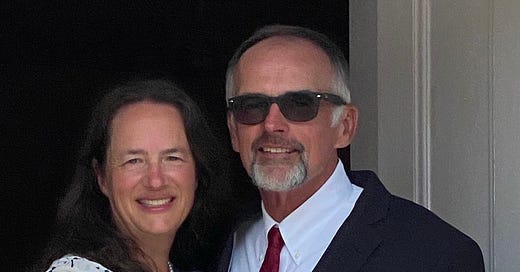And on July 4, 1776, the Second Continental Congress adopted the Declaration of Independence, declaring: “We hold these truths to be self-evident, that all men are created equal, that they are endowed by their Creator with certain unalienable rights, that among these are Life, Liberty and the Pursuit of Happiness.”
For all the fact that the congressmen got around the sticky little problem of Black and Indigenous slavery by defining “men” as “white men,” and for all that it never crossed their minds that women might also have rights, the Declaration of Independence was an astonishingly radical document. In a world that had been dominated by a small class of rich men for so long that most people simply accepted that they should be forever tied to their status at birth, a group of upstart legislators on the edges of a continent declared that no man was born better than any other.
America was founded on the radical idea that all men are created equal.
What the founders declared self-evident was not so clear eighty-seven years later, when southern white men went to war to reshape America into a nation in which African Americans, Indigenous Americans, Chinese, and Irish were locked into a lower status than whites. In that era, equality had become a “proposition,” rather than “self-evident.”
“Four score and seven years ago,” Abraham Lincoln reminded Americans, “our fathers brought forth on this continent, a new nation, conceived in Liberty, and dedicated to the proposition that all men are created equal.” In 1863, Lincoln explained, the Civil War was “testing whether that nation, or any nation so conceived and so dedicated, can long endure.”
It did, of course. The Confederate rebellion failed. The United States endured, and Americans began to expand the idea that all men are created equal to include Black men, men of color, and eventually to include women.
But just as in the 1850s, we are now, once again, facing a rebellion against our founding principle, as a few people seek to reshape America into a nation in which certain people are better than others.
The men who signed the Declaration of Independence on July 4, 1776 pledged their “Lives, [their] Fortunes and [their] sacred Honor” to defend the idea of human equality. Ever since then, Americans have sacrificed their own fortunes, honor, and even their lives, for that principle. Lincoln reminded Civil War Americans of those sacrifices when he urged the people of his era to “take increased devotion to that cause for which they gave the last full measure of devotion—that we here highly resolve that these dead shall not have died in vain—that this nation, under God, shall have a new birth of freedom—and that government of the people, by the people, for the people, shall not perish from the earth.”
Words to live by in 2022.
—
Note:
I have shared some version of this every year for the last few years. I wrote this quickly— actually running out the door— a few years ago, and no matter how long I sit at the laptop and fiddle, as I did this evening, I still think the original stands. It is a dark Independence Day in many ways this year, but I hope everyone is able to find at least a little respite, and to recall the whole point of what we’re up to in this country.
H.










It’s still perfect and I find a small measure of comfort in Lincoln’s words and in yours. Thank you for guiding us through this terrible, frightening time.
“Have you ever wondered what happened to the 56 men who signed the Declaration of Independence? Five signers were captured by the British as traitors, and tortured before they died. Twelve had their homes ransacked and burned. Two lost their sons in the revolutionary army, another had two sons captured. Nine of the 56 fought and died from wounds or hardships of the revolutionary war.
They signed and they pledged their lives, their fortunes, and their sacred honor.
What kind of men were they? Twenty-four were lawyers and jurists. Eleven were merchants, nine were farmers and large plantation owners, men of means, well educated. But they signed the Declaration of Independence knowing full well that the penalty would be death if they were captured.
Carter Braxton of Virginia, a wealthy planter and trader, saw his ships swept from the seas by the British Navy. He sold his home and properties to pay his debts, and died in rags.
Thomas McKeam was so hounded by the British that he was forced to move his family almost constantly. He served in the Congress without pay, and his family was kept in hiding. His possessions were taken from him, and poverty was his reward.
Vandals or soldiers or both, looted the properties of Ellery, Clymer, Hall, Walton, Gwinnett, Heyward, Ruttledge, and Middleton.
At the battle of Yorktown, Thomas Nelson Jr., noted that the British General Cornwallis had taken over the Nelson home for his headquarters. The owner quietly urged General George Washington to open fire. The home was destroyed, and Nelson died bankrupt.
Francis Lewis had his home and properties destroyed. The enemy jailed his wife, and she died within a few months.
John Hart was driven from his wife’s bedside as she was dying. Their 13 children fled for their lives. His fields and his gristmill were laid to waste. For more than a year he lived in forests and caves, returning home to find his wife dead and his children vanished. A few weeks later he died from exhaustion and a broken heart.
Norris and Livingston suffered similar fates.
Such were the stories and sacrifices of the American Revolution. These were not wild eyed, rabble-rousing ruffians. They were soft-spoken men of means and education. They had security, but they valued liberty more. Standing tall, straight, and unwavering, they pledged: “For the support of this declaration, with firm reliance on the protection of the divine providence, we mutually pledge to each other, our lives, our fortunes, and our sacred honor.””
What happened to the signers of the Declaration of Independence?
This is the Price They Paid -
https://michaelwsmith.com/the-sacrifices-made-by-the-declaration-signers/